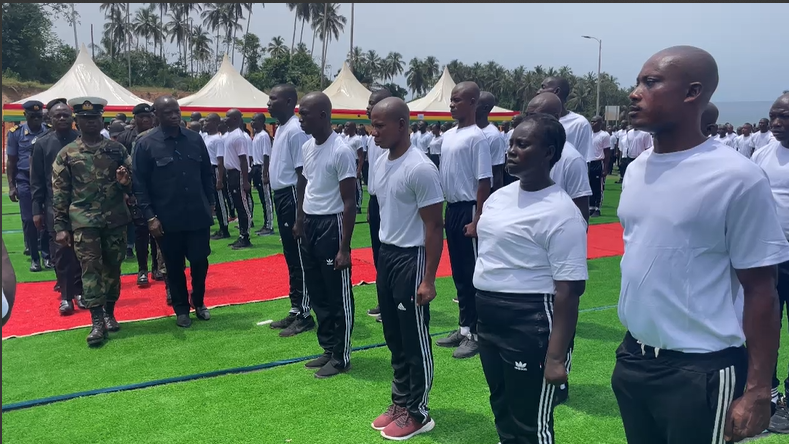Ghana’s relentless battle against illegal mining, locally known as galamsey, is entering a new phase with the launch of the Blue Water Guard Initiative. This national strategy aims to protect the country’s vital water resources from the devastating effects of galamsey by deploying trained personnel along rivers and streams to provide continuous surveillance and on-the-ground enforcement. The official induction of the first cohort of Blue Water Guards, marked by a passing out ceremony on April 14, 2025, signifies a renewed commitment to addressing this complex socio-economic and environmental challenge. The initiative focuses on restoring the health of polluted water bodies and preventing further degradation through proactive monitoring and rapid response to illegal mining activities. The Blue Water Guards represent the latest attempt to tackle a problem that has plagued Ghana for over a decade, leaving a trail of environmental destruction and social disruption in its wake.
The Blue Water Guard Initiative is built on a collaborative approach, integrating the efforts of various government agencies. The guards are expected to work in coordination with established institutions like the Ghana Armed Forces, the Forestry Commission, and the Water Resources Commission, ensuring a comprehensive and multi-faceted response to galamsey. This collaborative framework aims to enhance information sharing, improve operational efficiency, and strengthen the overall enforcement capacity. By leveraging the expertise and resources of different agencies, the initiative seeks to create a more robust and resilient system for protecting Ghana’s aquatic ecosystems. The integration of these agencies marks a departure from previous, more fragmented approaches and reflects a recognition of the need for a unified front against illegal mining.
The initiative incorporates elements of improved training, technological advancements, and accountability mechanisms to enhance its effectiveness. The Blue Water Guards receive specialized training, equipping them with the necessary skills and knowledge to identify, monitor, and report illegal mining operations effectively. Furthermore, the initiative utilizes real-time surveillance tools, enabling swift detection and response to illicit activities. These technological enhancements are crucial for addressing the often-clandestine nature of galamsey. A clear system of accountability ensures that personnel are responsible for their actions, promoting professionalism and integrity within the initiative.
Despite the government’s optimism and the enhanced features of the initiative, skepticism surrounds its long-term viability. This skepticism is rooted in the failures of past anti-galamsey efforts. Initiatives like Operation Vanguard and the deployment of River Guards, while showing initial promise, ultimately fell short due to inconsistent enforcement, corruption, and political interference. Civil society organizations, including the Media Coalition Against Illegal Mining and A Rocha Ghana, have voiced concerns about the Blue Water Guard Initiative, questioning its potential for lasting impact. They highlight the need for a transparent operational framework, robust monitoring mechanisms, genuine community engagement, and, crucially, unwavering political will to overcome the entrenched interests that perpetuate illegal mining.
The core of the criticism directed at the Blue Water Guard Initiative, and previous anti-galamsey efforts, centers on systemic weaknesses that undermine enforcement. Critics argue that the lack of transparency in operations creates an environment conducive to corruption and makes it difficult to assess the effectiveness of interventions. The absence of robust monitoring structures further hinders accountability and allows illegal activities to continue unchecked. Perhaps most importantly, the lack of genuine community engagement marginalizes local communities, who are often the first to suffer the consequences of galamsey. Without their active participation and support, any initiative risks becoming detached from the realities on the ground and ultimately failing to achieve its objectives.
The future of the Blue Water Guard Initiative, and indeed the fight against galamsey in Ghana, hinges on addressing these fundamental shortcomings. Beyond the deployment of personnel and the adoption of new technologies, success requires a genuine commitment to transparency, accountability, and community engagement. A robust legal framework, coupled with consistent and impartial enforcement, is essential to deter illegal mining activities. Crucially, the initiative’s effectiveness will depend on the political will to tackle the root causes of galamsey, including poverty, unemployment, and weak governance. Only by addressing these systemic issues can Ghana hope to overcome the enduring challenge of illegal mining and protect its precious natural resources for future generations. The success of the Blue Water Guard Initiative will not only be measured by its ability to curb illegal mining but also by its contribution to sustainable development and improved livelihoods in affected communities.














